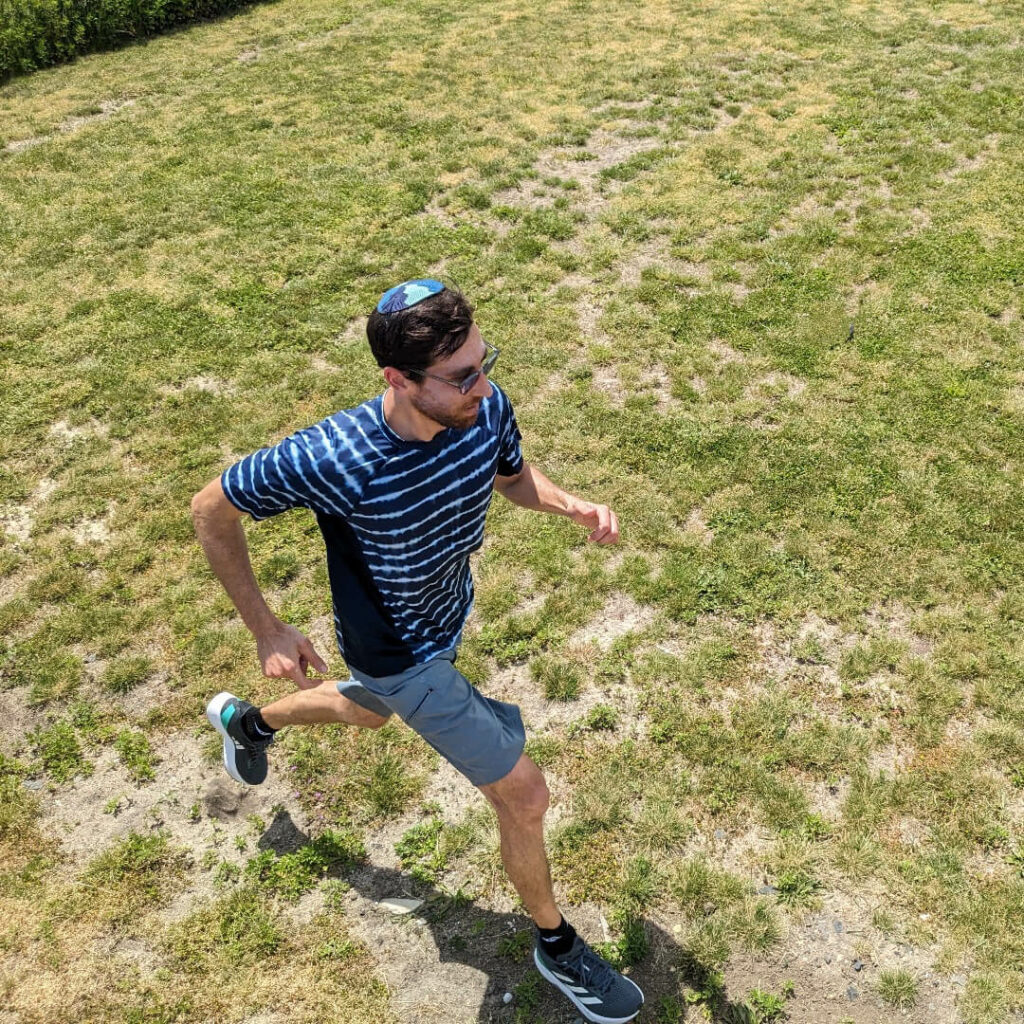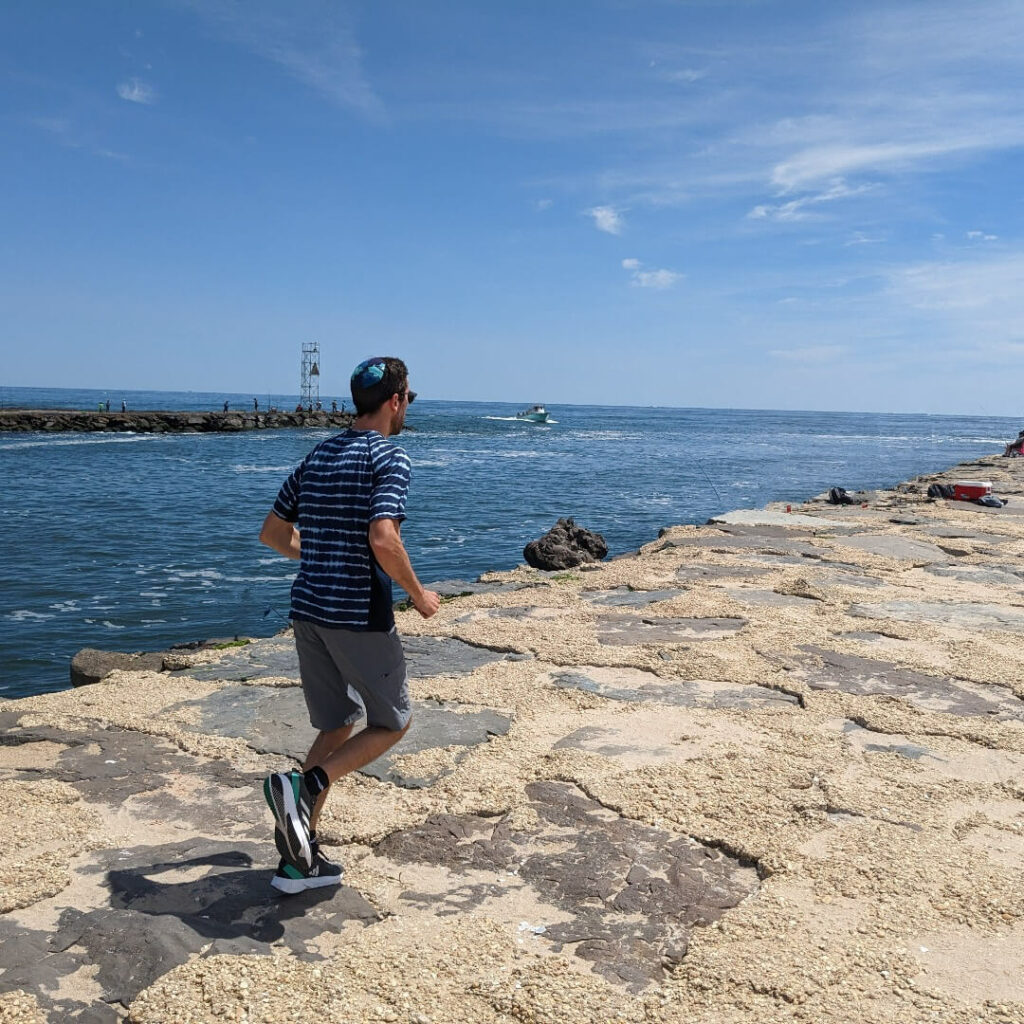We’ve all been there. Racing a fast approaching dusk with no headlamp and a few hours of trail running accumulated in our legs. A warm car and snacks are waiting patiently at a trailhead close by — or we hope close by. Maybe we make it before dark and flaunt some “Ain’t no gear getting a free ride on me” swagger. Maybe we miscalculate and drain the last few percentages of our phone battery rocking the awkward handheld flashlight. Or maybe we epic and start calculating how closely shorts with a 3-inch inseam and quarter-length arm warmers approach the amount of fabric in a bivy tent. These outcomes — and everything in between — are routine within our sport. But what if making it home by sundown was not just a lowkey flex, but a strict law? You’d probably dig deep, crank up the pace and maybe land a few unintentional Strava crowns along the way.
This law isn’t about one of those trailhead parking lots with a grouchy park ranger who will lock your Subaru Crosstrek behind the entrance gate if you leave it past 8 p.m. It’s a 3500-year-old commandment passed down an insanely deep and methodical lineage to observant Jewish people throughout every country on the planet: שמר את יום השבת — Shamor et yom ha Shabbat — Observe the Sabbath Day. A weekly 25-hour respite from the mechanics of daily life that starts at sundown on Friday night. The original rest day. What your coach schedules, but you still sneak in “a little shakeout” or some cross-training. Who knew Moses had a few things to say about Over Training Syndrome?
Observant Jewish life comes with a lot of laws. 613 if you ask the best rabbis of antiquity to count them up, and even more after three millennia of rabbinical additions. You’ll find observant Jewish athletes participating in every sport conceivable, but whether it’s visible or not, they are simultaneously adhering to all of the many Jewish laws. A 5k, or even a marathon can fit in between mandatory morning and afternoon prayers. But what about a sporting event that literally spans 24+ hours of non-stop, never-sitting-down movement? I mean, it sounds like a bad idea for anyone, but here we are.
While occupying exceptionally different niche spaces, observant Jewish life and long-distance running, both with a tendency towards having an “ultra” prefix, have undeniable parallels. High intensity, fervent dedication, full immersion around the clock and seemingly absurd rules (think: no painkillers at UTMB and packing mandatory thermal layers on an 85-degree race day). But is it possible for these two worlds to collide? What would it look like to run a 100-mile ultra trail race as an observant Jewish runner?

Ultra runners are absolute savages at parsing down to the bare minimum requirements to complete a task. Gear. Nutrition. Muscle mass. The nonnegotiables and nothing more. Judaism can be slimmed down to a set of nonnegotiables too. Let’s start with the most limiting observance in terms of prohibitions and timing: Shabbat. Shabbat is traditionally brought in 18 minutes before sunset on every Friday of your entire life and ends about an hour past sunset on Saturday. Running on Shabbat (not to mention racing) is barely, if at all, permissible. Here are some of the relevant laws:
- You cannot work on Shabbat. In our (amateur) running lives, a run falls more in the category of pleasure than work: we drive across town to spend an hour and a half increasing our macronutrient needs by a factor of 3; we drop $400 on a race entry halfway around the planet and take a week off work to run it. But your rabbi sees it differently: a physical overload = not rest = work. You can try the “Running is pure pleasure for me” argument, it’s kind of a good one, but I don’t think you will overturn the rabbinical consensus.
- You cannot carry on Shabbat. Nothing in your hands, nothing in your pockets. What about your ultra vest? That’s completely okay, you’re wearing, not carrying, it. But your ultra vest with a soft flask up front? Prohibited.
- The loophole: if your race director happens to be a rabbi who fixes an Eruv (a string suspended overhead — think telephone lines) to make a perimeter around the entire 100 mile course, you can put a snack in your pocket. It’s a tall ask.
- You cannot leave the limits of the town you are in. A looped race course might be fine, but we’re ultra trail runners, if you’re traveling overland for 100 miles, there’s a pretty good chance you’re going to travel from somewhere to somewhere else.
- You can’t drive or ride in a car. This one fits perfectly within the basic rules of any footrace as long as you can get yourself to the startline.
- You can’t use electricity. No Headlamp. No watch navigation. No race tracking. No phone. No music. These are fairly problematic. Can you benefit from the light of your competitor? That’s the right line of almost comical questioning that a Jewish scholar would take quite seriously. I think the answer is “yes, as long as you don’t ask them to shine it in a particular spot for you.” Jewish observance is hot on esoteric questioning.
- To honor Shabbat you should wear festive clothing and use your finest kitchen set. Look no further than Scott Traer for racing in high fashion. For plates and utensils, I’ve watched the pros go through aid stations at UTMB. I’m not sure how you can one-up your kitchen set when your kitchen set is shoveling potato chips and cookies into your mouth with both hands for 35 seconds before giving a chipmunk-cheeked wink to the camera on your way back onto the trail. I’ve also seen feral 10-year-olds at Shabbat dinner run pretty much the same maneuver. I think there’s some leniency with this one.
- You can’t tear. Or rather, you can, but you can’t. You can open your Gu, but you can’t tear off a sheet of toilet paper. There’s a reason the books on the Rabbi’s shelf are so thick. If you somehow manage to negotiate all of these prohibitions and land that epic Shabbat win, make sure to duck under the finish line tape.
- Lastly, you’re not allowed to be sad on Shabbat. This might be physiologically incompatible with the truly unique existential meltdown well known at mile 70.
In summary, a running race that overlaps with Shabbat is pretty much impossible for an observant Jewish runner to participate in. But are there any trail races around the 100-mile distance that are compatible with keeping Shabbat? A list of 50 races including the best-attended races in the USA and the UTMB World Series, identifies only two: UTMB TDS in Italy/France which starts on a Monday, and Eiger Ultra-Trail in Switzerland which starts on a Wednesday. There are a few other trail ultras that almost leave enough time to finish the race, but you would have to lower the male course record by a margin of hours. Maybe not impossible, but it would require some next-level training. I know what you’re thinking — the obvious alternative to all of the extra training — but I’m fairly sure most race directors view divine intervention as accepting disqualifying outside aid.
But two races is not no races. Let’s consider what running TDS would be like as a Jewish runner.
The race starts 10 minutes before midnight so all of Monday’s obligations will have been met earlier. The first encounter with Jewish law will likely be at aid station one. Mid-ultra food choices are already a palatability and GI labyrinth; now add kosher laws. Hechshers are the kosher certification symbols on food packaging you have definitely seen but may not have registered. They mean that at some point, an Orthodox Rabbi toured the product’s factory and deemed its ingredients and production to be in compliance with kosher laws. Not all foods have it, not all foods need it. No one said this would be easy. Smaller companies, like Tailwind, sell a product that is made from kosher ingredients but didn’t bother to get a kosher certification itself. Skratch on the other hand, is kosher certified and has a hechsher on the packaging. Just what an ultra runner needs, one more factor to melt down over when there’s a last-minute brand change at an aid station.
Kosher laws prohibit the mixing of meat and dairy, so the observant Jewish runner will have to pass up on the potentially-race-saving cheesy beef burrito at mile 80 and the 3 a.m. bacon pancakes (you’d be breaking a couple of prohibitions with that one). But you can have kosher meat and then something dairy later, where “later” depends a bit on your Jewish lineage, but is in the ballpark of after waiting 6 hours. Not an unthinkable lapse of time if you have 13,000 feet of climbing to slog out through the night. In other words, ultra running is a rare one-off activity where a Jewish participant could devour a kosher turkey hot dog at CP1 and a quesadilla at CP3. It’s the little things.
After a night of keeping kosher on our theoretical Jewish running of TDS, sunrise brings the first set of obligatory prayers (For men. Prayers are less obligatory for women – which is kind of problematic, but here we celebrate it as a rare women’s ultra running advantage passed down from ancient Mesopotamia). Morning prayers are the most comprehensive within a day and an observant man will have packed his Tefillin along for the whole race just for this moment. Tefillin are like a spiritual headlamp strapped next to your headlamp and a prayer-scroll-containing blood pressure cuff. Google it.
Morning prayers, said every day, in Hebrew, fully stopped with complete focus, usually take a solid 40 minutes, but classic Orthodox swagger is saying them so fast it makes the legal disclaimer for Zoloft sound like the Headspace app. Two shorter sets of prayers come around noon and sunset, along with situational blessings that would be frequent throughout the day over food, drinks, and natural wonders like lofty mountains. Blessings upon seeing exceptionally beautiful people and upon seeing exceptionally strange-looking people are another two, straight out of the book, blessings, but for ultra runners, we should probably talk to the rabbi about how to combine them into one.
We would be remiss to have this discussion without mentioning kippahs (yarmulkes) and wigs, but really both can be replaced with a trucker hat from your favorite trendy Boulder brand. I know…boring. Maybe BOCO makes a kippah.
And that’s about it. The entire rest of TDS will go off like it would for any other runner. But unavoidably, the observant Jewish ultra trail runner will be a sight to behold, putting all the daily ritualistic observances out on the trail. I’m not sure if it has been done before, but maybe now a seed has been planted. At Eiger or TDS, don’t be so surprised if you pass someone wearing an odd double headlamp or hear some Hebrew verses being muttered after slamming a kosher grilled cheese sandwich. The after-blessing for grilled cheese is kind of a long one.

[I would like to thank Raquel Schreiber, Ariel Benor and Rabbi Maury Kelman for double-checking the Halacha described in this article.]
